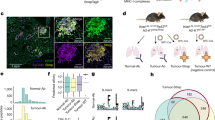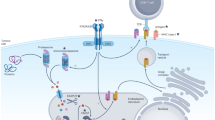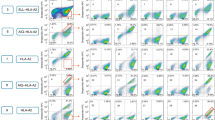Abstract
Tumours express a variety of novel epitopes which represent potential immune targets, and thus clinically evident tumours are thought to have effectively avoided immune recognition and elimination. Transporters associated with antigen presentation (TAP) are thought to be responsible for conveying intracellular peptides into the endo-plasmic reticulum for complex formation with class I MHC and subsequent recognition by cyto-toxic T lymphocytes1,2. In this study, we evaluated 79 human solid tumours and cell lines for genetic abnormalities in TAP1 that might have led to an acquired loss of antigen presenting ability. A novel sequence (R659Q) was discovered near the ATP binding site in a human small cell lung cancer (SCLC) cell line, H1436. This cell line is heterozgy-ous for this allele, but only the R659Q allele is transcribed into RNA. Even though the R659Q protein is expressed, these cells act as if they were TAP deficient by peptide binding and antigen presentation studies, which are restored after transfection of a functional TAP1 allele. This is the first evidence for a naturally occuring protein structural defect resulting in defective peptide transport in a human solid tumour.
This is a preview of subscription content, access via your institution
Access options
Subscribe to this journal
Receive 12 print issues and online access
$209.00 per year
only $17.42 per issue
Buy this article
- Purchase on Springer Link
- Instant access to full article PDF
Prices may be subject to local taxes which are calculated during checkout
Similar content being viewed by others
References
Kelly, A. et al. Assembly and function of the two ABC transporter proteins encoded in the human major histocompatibility complex. Nature 355, 641–644 (1992).
Gabathuler, R., Reid, G., Kolaitis, G., Driscoll, J. & Jefferies, W.A. Comparison of cell lines deficient in antigen presentation reveals a functional role for TAP-1 alone in antigen processing. J. Exp. Med. 180, 1415–1425 (1994).
Suzuki, Y., Orita, M., Shiraishi, M., Hayashi, K. & Sekiya, T. Detection of ras gene mutations in human lung cancers by single-strand conformation polymorphism analysis of polymerase chain reaction products. Oncogene 5, 1037–1043 (1990).
Walker, J.E., Saraste, M., Runswick, M.J. & Gay, N.J. Distantly related sequences in the alpha- and beta-subunits of ATP synthase, myosin, kinases and other ATP-requiring enzymes and a common nucleotide binding fold. EMBO. J. 1, 945–951 (1982).
Powis, S.H. et al. Alleles and haplotypes of the MHC-encoded ABC transporters TAP1 and TAP2. Immunogenet. 37, 373–380 (1993).
Bodmer, H., Ogg, G., Gotch, F. & McMichael, A. Anti-HLA-A2 antibody-enhancement of peptide association with HLA-A2 as detected by cytotoxic T lymphocytes. Nature 342, 443–446 (1989).
Abdel Motal, U.M., Zhou, M.X., Siddiqi, A.R. & Jondal, M. Regulation of MHC class I membrane expression by beta 2-microglobulin. Scand. J. Immunol. 38, 395–400 (1993).
Spies, T. & DeMars, R. Restored expression of major histocompatibilityclass I molecules by gene transfer of a putative peptide transporter. Nature 351, 323–324 (1991).
Restifo, N.P. et al. Identification of human cancers deficient in antigen processing. J. Exp. Med. 177, 265–272 (1993).
Sanda, M.G., Restifo, N.P. & Walsh, J.C. Molecular characterization of defective antigen processing in human prostate cancer. J. Natl. Cancer Inst. 85, 280–285 (1995).
Kaklamanis, L., Leek, R., Koukourakis, M., Gatter, K.C. & Harris, A.L. Loss of transporter in antigen processing 1 transport protein and major histocompatibility complex class I molecules in metastatic breast cancer. Cancer Res. 55, 5191–5194 (1995).
de la Salle, H. et al. Homozygous human TAP peptide transporter mutation in HLA class I deficiency. Science 265, 237–241 (1994).
Doyle, A. et al. Markedly decreased expression of class I histocompatibility antigens, protein, and mRNA in human small-cell lung cancer. J. Exp. Med. 161, 1135–1151 (1985).
Sambrook, J., Fritsh, E.F. & Maniatis, T. Molecular Cloning: A Laboratory Manual. (Cold Spring Harbor Laboratory, New York, 1989).
Meyer, T.H., van Endert, P.M., Uebel, S., Ehring, B. & Tampe, R. Functional expression and purification of the ABC transporter complex associated with antigen processing (TAP) in insect cells. FEBS Lett. 351, 443–447 (1994).
Bhardwaj, N. et al. Influenza Virus-infected Dendritic Cells Stimulate Strong Proliferative and Cytolytic Responses from Human CD8+ T Cells. J. Clin. Invest. 94, 797–807 (1994).
Author information
Authors and Affiliations
Rights and permissions
About this article
Cite this article
Chen, H., Gabrilovich, D., Tampé, R. et al. A functionally defective allele of TAP1 results in loss of MHC class I antigen presentation in a human lung cancer. Nat Genet 13, 210–213 (1996). https://doi.org/10.1038/ng0696-210
Received:
Accepted:
Issue Date:
DOI: https://doi.org/10.1038/ng0696-210



